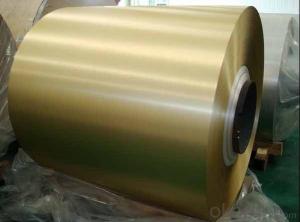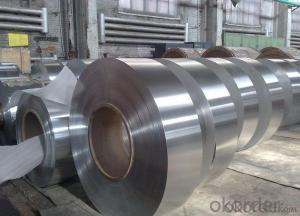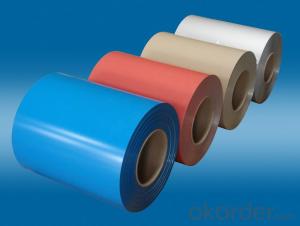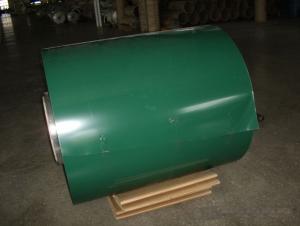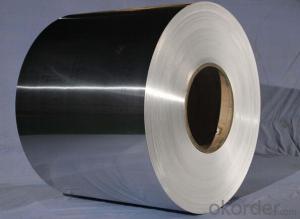Coil Aluminum Roll for Coated Aluminium Garage Door
- Loading Port:
- Shanghai
- Payment Terms:
- TT OR LC
- Min Order Qty:
- 2 m.t.
- Supply Capability:
- 50000 m.t./month
OKorder Service Pledge
OKorder Financial Service
You Might Also Like
Specification
Coated Aluminium Coil/Roll For Aluminium Garage Door
Description
Alloy | 1060, 1100, 3003, 8011, etc. |
Temper | H16, H18, H24, H26, H28 |
Thickness | From 0.05mm to 3.0mm |
Width | Standard width:1240mm |
Special width:1300mm, 1520mm, 1570mm, 1595mm | |
Diameter | Standard dia:1200mm |
Interior dia:150mm,405mm,505mm | |
Weight | 2.5 T/coil,3.0 T/coil |
Coating | PE, PVDF, ACRYLIC |
Surface | Embossed, mill finish, coated |
Color | AS to code RAL |
Gloss | 10-90%(EN ISO-2813:1994) |
Coating Thickness | PE: more than 18 micron |
PVDF: more than 25 micron | |
Coating Hardness(pencil resistance) | More than 2h |
Coating adhesion | 5J (EN ISO-2409:1994) |
Impact Resistance | No peeling or cracking(50 kg/cm,ASTMD-2794:1993) |
Flexibility(T-bend) | 2T |
MEK resistance | More than 100 |
Advantage | 1.High temperature resistant 2.Weathering resistant 3.Scrubbing resistant 5.Acid or alkali proof 6. Fireproof 7.Light weight material is easy to construct and install |
Out package | Wooden splint with export standard |
Application | ACP, wall cladding, facades, roofs and canopies, ceilings, signboards, blind window, display platforms, electrical panels, etc |
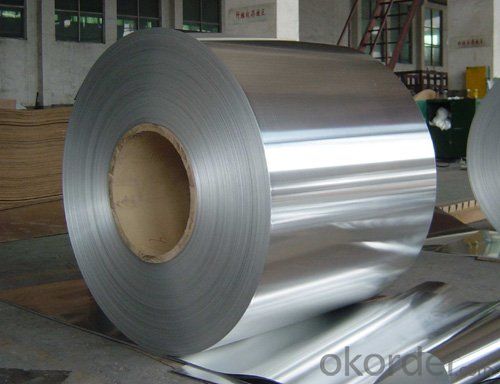
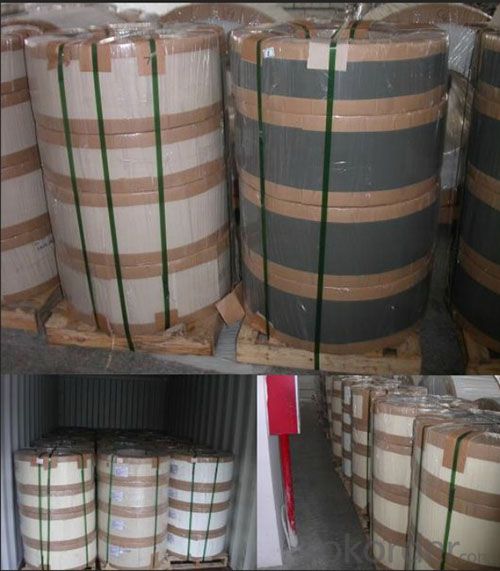
Manufacturing
Decoiler → Accumulator →Tension Leveler →Acid & Alkali Cleaner → Rinse →Conversion Treatment → Priming coater →Infrared Curing Oven →Main coater →Floatation Curing Oven →Strippable Film Applicator → Exit Accumulator → Recoiler
FAQ
--Q: Do you provide free samples?
--A: Yes, free samples will be sent to you on freight at destination.
--Q: Can I get your latest products catalogue?
--A: Yes, it will be sent to you in no time.
--Q: What is the MOQ?
--A: 2 tons
--Q: What are your payment terms?
--A: We accept L/C, T/T.
--Q: What kinds of alloy can you supply?
--A: 1000 series: 1050, 1060, 1070, 1100, 1145, 1200
3000 series: 3003, 3004, 3105, 3104
5000 series: 5052, 5083, 5754, 5182
6000 series: 6061, 6063, 6062, 6063
8000 series: 8011, 8021
--Q: What kinds of temper can you supply?
--A: O-H112: O,H12,H14,H16,H18,H22,H24,H26,H,32,H34,H111,H112
T3, T4, T6
- Q: Can aluminum coils be used in solar panel installations?
- Indeed, solar panel installations can make use of aluminum coils. The lightweight properties, corrosion resistance, and remarkable thermal conductivity of aluminum make it a favored material for constructing solar panels. Frequently, aluminum coils are employed as the supportive backing material for solar panels, ensuring both structural stability and effective heat dissipation. Additionally, these coils are commonly utilized in the production of solar mounting systems, which securely hold the panels in position. All in all, aluminum coils present a dependable and efficient choice for solar panel installations.
- Q: when ferrous sulfate is poured into an aluminium can, holes appear in the can. Why?
- aluminum reacts via a redox reaction with iron(II): 3 Fe2+(aq) + 2 Al(s) --- 3 Fe(s) + 2 Al3+(aq)
- Q: What are the different surface finishes available for aluminum coils?
- There are several different surface finishes available for aluminum coils, including mill finish, brushed finish, embossed finish, anodized finish, and painted finish.
- Q: what is aircraft grade aluminum?
- Aircraft grade Aluminum is made to be very durable and strong, also Aluminum does not rust.
- Q: Are there any limitations on the anodizing of aluminum coils?
- The anodizing of aluminum coils is subject to certain limitations. To begin with, the size and weight of the aluminum coils can present constraints. Anodizing is typically carried out in tanks or baths, so the coil must fit within the tank's capacity. Moreover, larger and heavier coils may necessitate specialized equipment or processes to ensure proper anodizing. Furthermore, the alloy composition of the aluminum coils can impact the anodizing process. Different aluminum alloys respond differently to anodizing, and some alloys may not anodize as effectively as others. It is crucial to consider the alloy composition and seek advice from experts to determine the suitability and potential limitations of anodizing specific aluminum coils. Additionally, the surface condition of the coils can influence the quality of anodizing. Imperfections such as scratches, dents, or surface contaminants can affect the consistency and uniformity of the anodized layer. It is vital to thoroughly clean and prepare the coils before anodizing to achieve the desired outcome. Lastly, certain design features or complex shapes of the aluminum coils can present challenges for anodizing. Anodizing involves immersing the coil in an electrolyte solution, and intricate designs or complex shapes may hinder the achievement of a uniform coating thickness. Overcoming these limitations may require specialized masking or racking techniques. Collaborating closely with anodizing experts or service providers is essential to comprehend and address any limitations specific to the aluminum coils, ultimately achieving the desired anodizing results.
- Q: What is the modulus of elasticity of aluminum coils?
- The modulus of elasticity of aluminum coils, also known as Young's modulus, is a measure of the material's stiffness and its ability to resist deformation under an applied load. The modulus of elasticity for aluminum coils is typically around 70 GPa (gigapascals) or 10 million psi (pounds per square inch). This value may vary slightly depending on the specific alloy and temper of the aluminum used in the coils. The modulus of elasticity helps determine the strength and flexibility of aluminum coils, making it an important factor in various applications such as construction, automotive, and aerospace industries.
- Q: I have been reading up on thermite and the required ingredients. I have extremely fine aluminum powder from a small etch-a-sketch sitting on plastic wrap in my room. On the comments page of the site i got the thermite ingredients from, multiple people said that thermite could explose if you use too fine of a powder. I have also read that powdered aluminum can become very explosive when it is exposed to air or if it becomes damp. Ive gotten particulary worried because the humidity right now is 93%. So, is powdered aluminum too dangerous to have in house and is too fine powdered aluminum explosive when in thermite?
- It is now not aluminum powder; it's ALUM powder, which is one more chemical. Nonetheless, it would not fairly tighten your vagina, despite what some commercials will say. I've not heard of beydary capsules, but I also doubt that they might do anything to fix the predicament either. If a real vaginal shrinking capsule was once on hand, it would be recognized and really trendy, similar to viagra is. Your best wager is to do kegel exercises to fortify and tone your vaginal muscular tissues. These, and nothing else, can help make your vagina tighter.
- Q: This question asks for criteria or methods to determine if an aluminum coil is of high quality.
- <p>To identify a good quality aluminum coil, consider the following factors: purity indicated by the alloy number, surface finish which should be smooth and free from defects, thickness consistency, and mechanical properties such as tensile strength and elongation. Check for certifications or quality standards compliance. Look for uniform color and absence of oil stains or rust. The coil should have precise dimensions and be free from dents or scratches. Additionally, consider the supplier's reputation and customer reviews.</p>
- Q: Are aluminum coils suitable for architectural louvers?
- Indeed, architectural louvers can be constructed using aluminum coils as they possess remarkable corrosion resistance, a lightweight composition, and a commendable strength-to-weight ratio. The malleability and manipulability of aluminum coils grant them the ability to be effortlessly shaped and fabricated into diverse forms and dimensions, thereby rendering them exceptionally suitable for fashioning aesthetically appealing and practical louvers. Moreover, the robustness of aluminum guarantees that the louvers will endure severe weather conditions and retain their structural integrity for an extended period. In conclusion, aluminum coils serve as a dependable and adaptable material choice for architectural louvers.
- Q: Explain the distinctions between aluminum coil and aluminum foil, highlighting their physical properties and applications.
- <p>Aluminum coil and aluminum foil are both made from aluminum but differ in thickness and applications. Aluminum coil is a flexible and continuous roll of aluminum, typically thicker and stronger than foil, used in manufacturing processes such as construction, packaging, and automotive parts. It can be easily cut and shaped. Aluminum foil, on the other hand, is a very thin and lightweight material, often used for food packaging, cooking, and insulation due to its excellent barrier properties against air, moisture, and light. It's less durable than coil and is not typically used in structural applications.</p>
Send your message to us
Coil Aluminum Roll for Coated Aluminium Garage Door
- Loading Port:
- Shanghai
- Payment Terms:
- TT OR LC
- Min Order Qty:
- 2 m.t.
- Supply Capability:
- 50000 m.t./month
OKorder Service Pledge
OKorder Financial Service
Similar products
Hot products
Hot Searches
Related keywords
